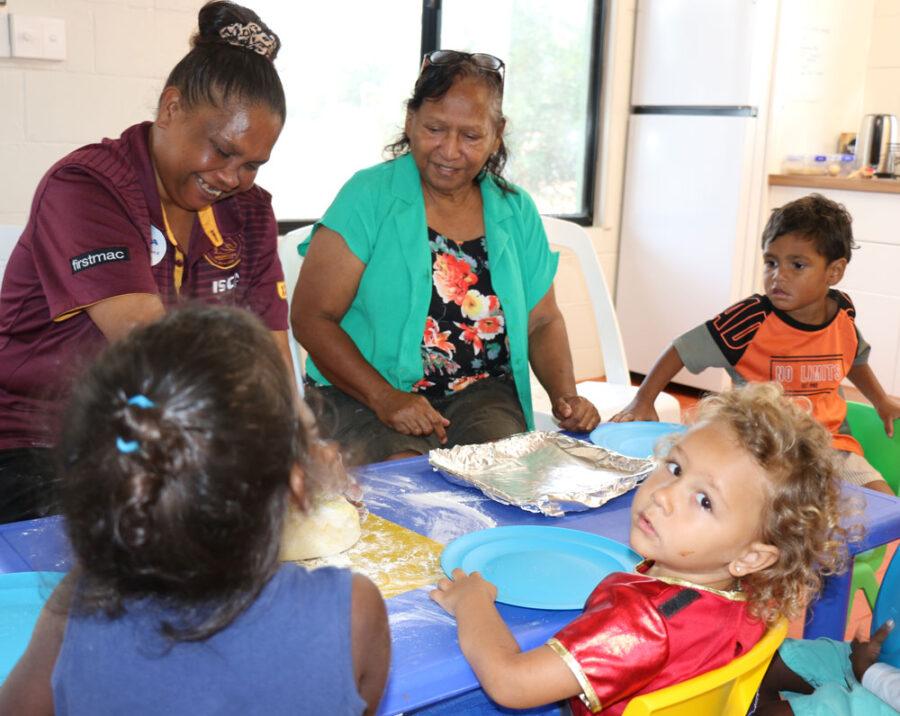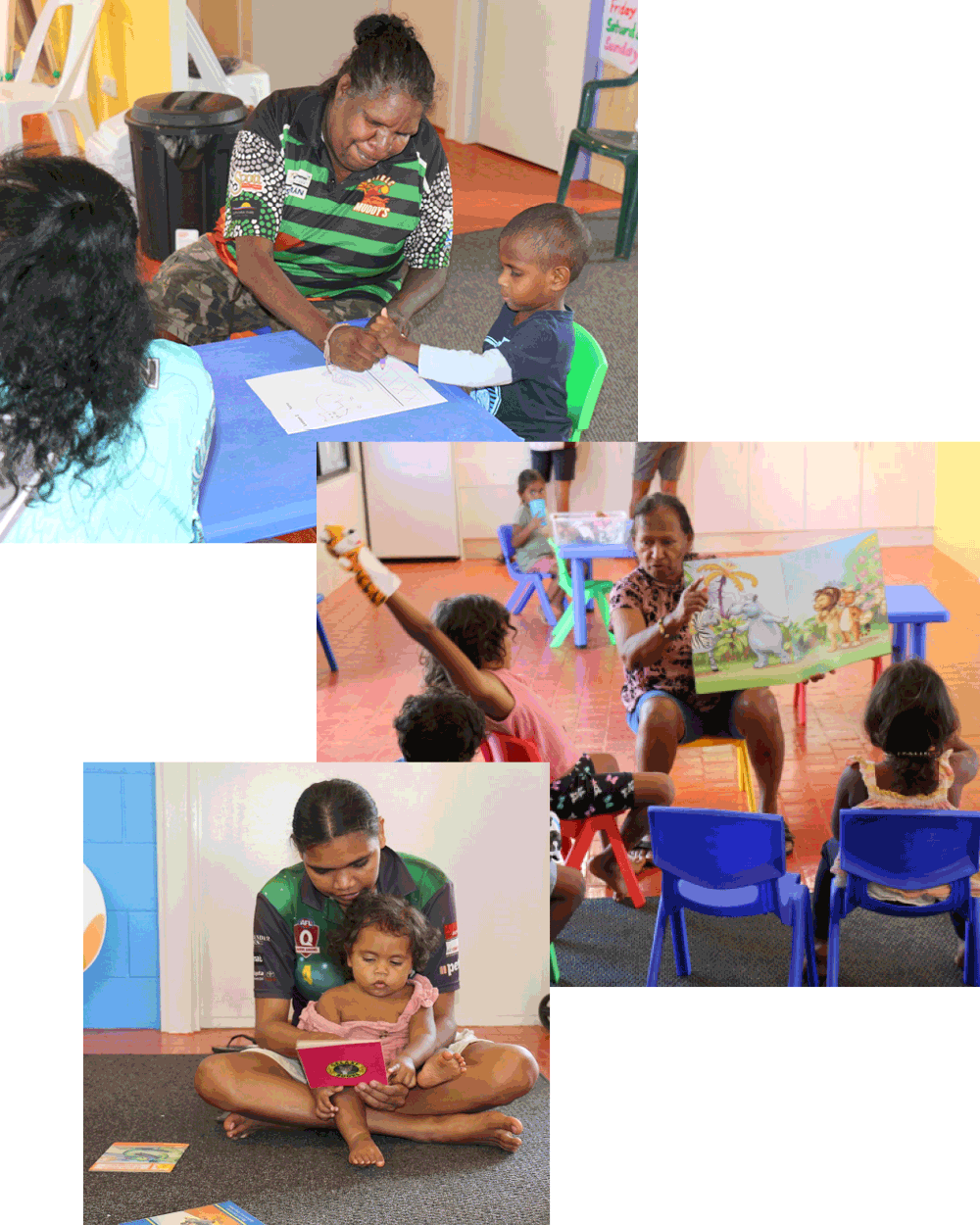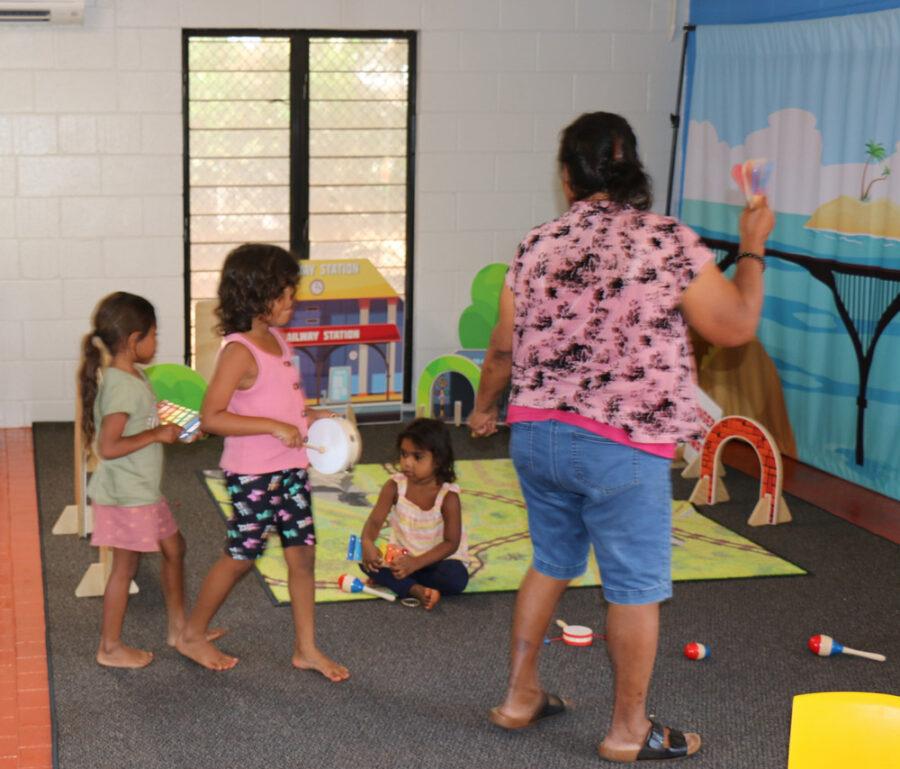
Guugu Yimithirr Playschool
The Playschool was launched in October 2021 by the Alliance of Guugu Yimithirr People who are the residents of the Hope Vale community.
Community led and supported by our team at Good to Great Schools Australia, this program was implemented because the community identified the need for learning opportunities for their young children in their community.
When: 8.30 am – 1.00 pm, Tuesdays, Wednesday, Thursdays, Fridays
Where: Muni Street, Hope Vale (between the church and the library)
Hope Vale families can join the Playschool Facebook Group.


Activities at Guugu Yimithirr Playschool
Guugu Yimithirr Playschool uses a play-based approach to develop children to be fully ready for their first day of primary school. Community and family involvement is key, so the program is continually developing strategies to engage parents and leaders.
Guguu Yimithirr Playschool is run by experienced and well-trained local grandmothers. Parents and grandparents attend with their children, so they are engaged in their child’s education from the start.
Health and wellbeing services are also built into the program with regular visits by health professionals to ensure these children are getting the best possible start in life.
Language and literacy development
Guugu Yimithirr Playschool has a structured curriculum that integrates early reading and writing skills with play. This integration children’s own participation and initiative, so they infuse activities with their own interests and concerns.
English language skills
The language and pre-literacy program is Direct Instruction Kindergarten, which is delivered by a teacher to develop children’s English language skills.
Narrative-based play
The teacher reads a storybook to the group, which children and parents act out through symbolic narrative play to mobilise children’s imagination, emotion and early-literacy cognition.
Shared book reading
In shared book reading, parents talk through a familiar picture storybook with the child. Parents sit with their child and read aloud the book with them. Each story is read many times.


Instrumental music and singing
Guugu Yimithirr Playschool gives children the chance to learn music. Music and singing builds creativity, confidence and helps get children ready for school. Musical play is also an important component of building numeracy skills that can be expanded upon through group play activities using blocks, shapes and counting games.
Musical components of the program include:
- singing simple nursery rhymes
- question and answer games
- using speech rhythm and rapping
- introduction to musical instruments
- dance and movements based on rhythmic patterns
- music games and song writing.
Visiting artists will train staff and run special activities. Parents will participate too and join the fun!
Parenting skills development
Parents are supported by the playgroup’s student development officer, who coaches them on reading with their child and supporting their readiness for Prep.
The student development officer gets to know the parents to learn about their skills and challenges. They educate parents in ways to support their child, then work with them to put commitments in place.
Parents who attend spend time playing with their children during some activities and receive training themselves during others.
While their child is receiving instruction, parents attend parenting support sessions or have honest conversations about the specific needs of their children.
The model uses some materials from the Abecedarian Approach, which is a play-based program that supports families through modelling, side-by-side engagement and discussion.
Ensuring early cognitive, social and emotional development
The first years of a child’s life are critically important to their lifelong development. The skills infants, toddlers and pre-schoolers develop are critical for their success in school and beyond. All children, especially those born into disadvantaged circumstances, need early education intervention to ensure cognitive, social and emotional development.
Without intervention, many disadvantaged children arrive at school well below the major developmental milestones:
- language and literacy
- numeracy and early number concepts
- self-regulation
- physical health.
Any development gaps in early childhood are difficult to close in school.
Child-centred health services
An early-years allied health model will be centred in the playgroup:
- start-up practice of health professionals coming into the centre so families don’t have to leave the playgroup
- regular visits by health professionals (e.g. fortnightly)
- case manage the referral and follow-up process
- build a community calendar of specialist visits (so everyone knows when a specialist is in town)
- form partnerships with local and visiting health services to improve available supports.

